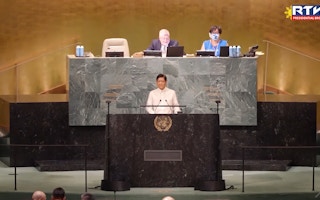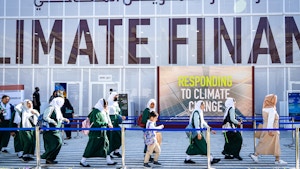Rich nations must meet their finance pledges in the fight against climate change, Philippine president Ferdinand Marcos, Jr told the United Nations General Assembly in New York, United States on Tuesday.
In his first time to address the world’s most important diplomatic gathering, Marcos said he “looks forward to concrete outcomes [for climate funding] at the Conference of Parties in Egypt later this year.”
The 27th Conference of the Parties of the UN Framework Convention on Climate Change (COP27) is expected to drive long-overdue financial assistance for developing countries in November, as wealthy countries have failed to deliver on their promise of US$100 billion a year to help poorer nations, such as the Philippines, curb damages from natural disasters.
“We call on the industrialised countries to immediately fulfill their obligations under the United Nations Framework Convention on Climate Change and the Paris Agreement to cut their greenhouse gas emissions, provide climate financing and technology transfer for adaptation for the most vulnerable and developing countries to lead by example,” said Marcos, the first Philippine leader to physically attend the summit in eight years.
Marcos called the effects of climate change “uneven and reflect an historical injustice” where countries least responsible like the Philippines suffer the most.
“[The Philippines] is a net carbon sink, we absorb more carbon dioxide than we emit. And yet, we are the fourth most vulnerable country to the effects of climate change. This injustice must be corrected, and those who need to do more must act now,” he said.
However, he said the country will accept its share of its responsibility and will continue to do its part to avert climate disaster.
He said the country is “laying the governance framework” that will harness the power of renewable energy as well as update the global structures that facilitate international cooperation on the “peaceful uses of nuclear energy”.
In his first state of the nation address in July, he called to re-examine nuclear power as one of the means to support the country’s energy needs.
Three months before Marcos’ predecessor Rodrigo Duterte ended his six-year term in office in May, he issued an order which approves the inclusion of nuclear power in the Philippine energy mix and revisits the reopening of the shelved Bataan Nuclear Power Plant (BNPP). The plant was built during the presidency of Marcos’ father, the late dictator Ferdinand E. Marcos, who was ousted from power in a 1986 uprising.
The BNPP was completed in 1984 at a cost of US$1.9 billion. However, due to financial issues and safety concerns related to earthquakes, the plant was never loaded with fuel or operated.





















